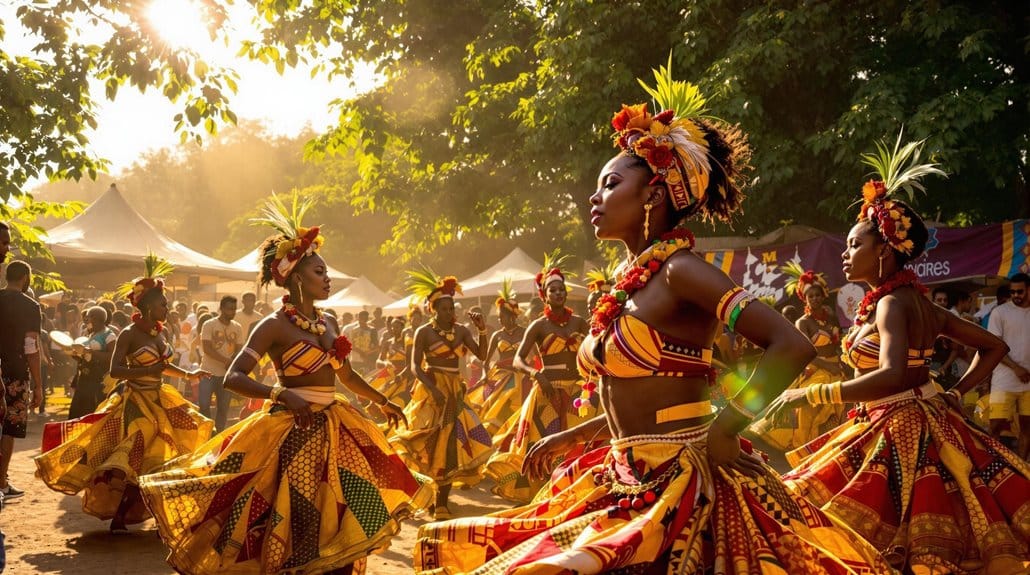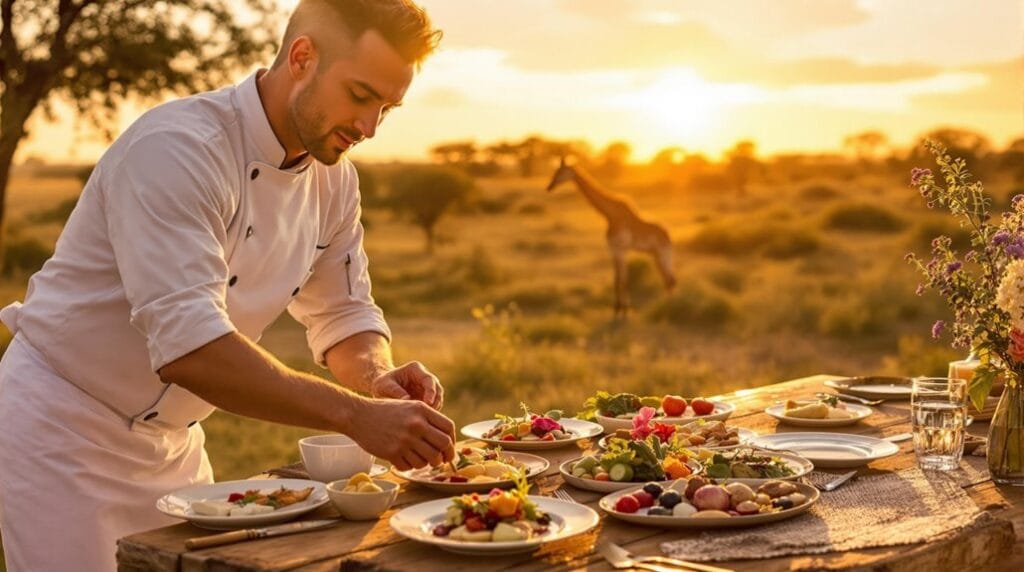When you explore Africa's festivals, you're swept into a world brimming with color and music. Each celebration vibrates with the pulse of ancestral pride, from the rhythmic Zulu dances echoing unity to Nigeria's Osun-Osogbo festival honoring nature's spirit. You can taste the rich culinary traditions, like Ethiopia's communal feasts that weave generational bonds. Lively melodies fill the air, carried by instruments like the kora, echoing stories of resilience and joy. Each festival connects people, fosters belonging, and preserves unique cultural identities. The vibrant tapestry of celebrations holds secrets waiting to be uncovered, inviting you to discover more.
Key Takeaways
- African festivals embody cultural heritage, uniting communities through shared traditions, rituals, and celebrations that enhance social bonds and identity.
- Events like Sham el-Nessim and the Osun-Osogbo festival highlight the significance of nature, spirituality, and seasonal changes in African cultures.
- Music and dance play crucial roles in festivals, fostering unity and reflecting cultural identities through traditional rhythms, instruments, and communal participation.
- Culinary traditions showcased during festivals enhance community connections, with traditional dishes serving as narratives that connect individuals to their cultural roots.
- Festivals support local artisans and preserve heritage, promoting intergenerational bonds and a vibrant expression of identity within diverse African communities.
The Essence of African Festivals
Plunge into the heart of Africa, where festivals burst forth like vibrant blossoms, each one a kaleidoscope of culture and history. You can feel the pulse of African music resonating through the air, wrapping around you like a warm embrace.
As you step into the celebration of Sham el-Nessim in Egypt, the aroma of salted fish and eggs wafts past, a delicious nod to ancient Pharaonic customs.
In South Africa, the energetic Zulu dances pull you into a whirl of rhythm, each movement telling stories of ancestry, pride, and unity. These moments are more than just festivities; they're a reflection of the continent's rich cultural heritage.
Gathering around communal feasts in Ethiopia, you notice how sharing a meal fosters bonds that transcend generations. Here, traditional crafts and art forms flourish, weaving a narrative of continuity that connects you to those who came before.
Each festival you encounter becomes a thread in a larger tapestry, reminding you of the beauty of belonging, the strength in shared traditions, and the vibrant spirit of a continent that celebrates its people with every beat of the drum.
Celebrating Cultural Diversity
Across the vast expanse of Africa, festivals brim with life, each one a vibrant expression of the continent's rich tapestry of cultures. You find yourself amid the jubilant energy of the Sham el-Nessim festival in Egypt, where the arrival of spring brings together people from every walk of life, united by traditions that have shaped their shared history. The air is fragrant with spices, and laughter dances alongside traditional melodies.
In South Africa, the rhythmic beats of the Zulu Reed Dance echo through the valleys, celebrating not just the music and dance but also the profound sense of community and cultural pride that binds the Zulu people.
You witness the Osun-Osogbo festival in Nigeria, where worshippers honor the goddess Osun, emphasizing nature's importance and spirituality within the Yoruba culture.
As you savor local delicacies, each bite tells a story of heritage and connection, offering a culinary journey that fosters kinship and cultural understanding.
These festivals illuminate the cultural richness of Africa, inviting you to belong to something greater, to celebrate the vibrant traditions that breathe life into communities across the continent.
Festivals as Community Connectors
As you wander through the bustling streets during Sham el-Nessim, the air buzzes with laughter and the rich aromas of traditional dishes that bring everyone together.
Each festival becomes a tapestry of vibrant rituals and shared memories, where the community bonds over music, dance, and the joy of celebrating their heritage.
You can feel the heartbeat of the culture as locals unite, reinforcing their identity and weaving stronger ties that connect generations.
Unifying Cultural Celebrations
In the heart of Africa, festivals pulse with life, weaving together the rich tapestry of cultures and traditions that define communities. You can feel the energy in the air as Sham el-Nessim unfolds in Egypt, where families gather, united by their deeply rooted heritage. The vibrant colors of traditional attire dance in the sunlight, while laughter and music fill the atmosphere, creating a sense of belonging that transcends individual differences.
You've got to experience the way these celebrations bring people together, showcasing cultural traditions that bind generations. Each festival tells a story, reflecting the unique significance of its community. As you join in, you'll witness the joyous rhythms of traditional music and the enchanting movements of dance, each performance echoing shared values that strengthen social ties.
The communal spirit thrives during these moments, encouraging collaboration and interaction. Here, you'll find a tapestry of flavors, with every dish served symbolizing the history and unity of those gathered.
It's in these festivals that you discover not just a celebration, but a collective memory, a reminder of the rich heritage that connects everyone in Africa.
Traditional Foods and Rituals
Festivals in Africa aren't just about music and dance; they're a vibrant feast of traditional foods and rituals that deepen community connections.
Picture yourself at Sham el-Nessim in Egypt, where the air is filled with the scent of salted fish, fresh onions, and vibrant eggs. Families gather, sharing these dishes, forging bonds that echo through generations.
In Ethiopia, the communal aspect of dining comes alive with injera, that delightful sourdough flatbread, served alongside colorful stews. You can feel the warmth of togetherness as hands reach across the table, breaking bread and sharing laughter.
Each bite is a connection to the land and the people, a celebration of cultural heritage. Across the continent, festivals unfold as opportunities to honor ancestral traditions.
The preparation and sharing of traditional foods are rituals in themselves, reinforcing the importance of cultural continuity. As you partake in these culinary delights, you're not just tasting flavors; you're embracing the stories, the history, and the community connection that binds everyone together.
In every festival, you find a tapestry of flavors that nurtures a sense of belonging, strengthening the ties that weave communities into a rich, living mosaic.
Community Bonding Activities
Gathering together during festivals in Africa sparks a unique energy that resonates deeply within communities. You're surrounded by vibrant colors, rhythmic music, and the tantalizing aroma of traditional dishes.
These festivals aren't just events; they're essential community bonding activities that celebrate cultural heritage and foster connections. As you participate, you'll feel the warmth of belonging.
Imagine the scene:
- Communal Feasting: Tables laden with mouthwatering dishes invite everyone to share and savor.
- Collaborative Performances: Groups come together, dancing and singing, weaving stories that echo through generations.
- Cultural Storytelling: Elders recount tales of yesteryears, instilling pride and identity in younger hearts.
In these moments, you witness the essence of community. Each shared laugh, every dance step, strengthens social ties, and your identity intertwines with the rich tapestry of your heritage.
Festivals create platforms for expressing pride, reinforcing collective memory. As you immerse yourself in these experiences, you realize that you're not just an observer; you're part of a larger story, a vibrant community that celebrates its roots while looking ahead.
In Africa, festivals truly connect hearts and souls.
The Role of Music and Dance
Experience the pulsating rhythms and vibrant melodies that define Africa's rich tapestry of culture, where music and dance breathe life into every festival. As you step into the heart of a celebration, the air fills with the enchanting sounds of the kora, its 21 strings weaving ancient tales that echo through time.
In South Africa, the infectious energy of Zulu drumming beckons you to join in, inviting you to express your spirit through rhythmic movements that celebrate community pride.
Every festival becomes a canvas of emotional depth and cultural identity, where instruments like the djembe and mbira resonate with the heartbeats of the people. Picture yourself at the Fes Festival of World Sacred Music, surrounded by a global audience drawn together by the sheer power of live performances that showcase Africa's artistic heritage.
In these moments, you'll feel the magic of participation—each dance step and musical note fostering a sense of belonging and unity. Here, you'll connect with your roots and celebrate a shared heritage that transcends borders, reminding you that music and dance are the lifeblood of Africa's festivals, weaving connections among its diverse peoples.
Culinary Traditions at Festivals
As you wander through the vibrant stalls of an African festival, the tantalizing aromas of spices and simmering dishes draw you in, inviting you to explore a culinary landscape rich in tradition and meaning.
Each dish tells a story, connecting you to the heart of the culture. In South Africa, culinary traditions bring communities together, creating bonds that transcend time and place.
Here are three must-try festival delights:
- Bunny Chow – A hollowed-out loaf filled with flavorful curry, perfect for sharing with loved ones.
- Bobotie – A savory baked dish, blending spices and sweetness, reflecting the nation's diverse heritage.
- Braai – The quintessential South African barbecue, where families gather to celebrate with grilled meats and hearty sides.
As you savor each bite, you realize that these dishes carry more than just delicious flavors; they symbolize prosperity, fertility, and unity.
Festivals emphasize communal eating, making you feel like you belong, as you share injera in Ethiopia or salted fish in Egypt.
Through these culinary experiences, you gain deeper insights into local customs, discovering that food is truly a medium for storytelling and cultural expression across Africa.
Preserving Heritage Through Celebrations
Amid the lively beats of drums and the vibrant colors of traditional attire, African festivals pulse with the heartbeat of heritage, inviting you to partake in centuries-old traditions. Each celebration, from Sham el-Nessim in Egypt to the Zulu Reed Dance, embodies the spirit of African culture, marking not just seasonal changes but the essence of historical significance.
You'll find communities uniting, sharing traditional foods, music, and dances that breathe life into local customs. As you join in, you'll witness ancient practices and rituals passed down through generations, ensuring the rich tapestry of cultural values remains intact.
The air buzzes with laughter and storytelling, reinforcing your connection to the past and cultivating a sense of pride and belonging among diverse cultural landscapes. The vibrant displays of traditional arts and crafts don't just dazzle your senses; they support local artisans and preserve intricate practices that might otherwise fade away.
Frequently Asked Questions
What Are the Origins of Specific African Festivals?
When you explore the origins of specific African festivals, you'll uncover their rich historical roots that shape their cultural significance.
Each celebration tells a story, drawing from age-old traditions and communal values.
Picture the vibrant colors, rhythmic music, and spirited dances that connect people across generations.
You're not just witnessing a festival; you're stepping into a living tapestry of heritage, where every event fosters belonging and unity among diverse communities.
How Do Festivals Impact Local Economies and Tourism?
Festivals breathe life into local economies, drawing visitors who crave cultural exchange.
You stroll through vibrant markets, savoring tantalizing aromas of street food, while artisans showcase their crafts. Each celebration fosters festival sustainability, ensuring traditions thrive for generations.
As you dance to rhythmic beats, you feel a sense of belonging, connecting with locals and fellow travelers alike. These moments not only enrich your experience but also uplift communities, weaving a tapestry of shared joy and prosperity.
Are There Any Notable Festivals That Celebrate Contemporary Issues?
You'll find festivals that pulse with the heartbeat of contemporary issues, like the vibrant Social Justice Festival.
Picture a kaleidoscope of voices, where art and activism merge, celebrating cultural identity while tackling pressing social challenges.
As you wander through colorful stalls and lively performances, you can feel the energy shift, igniting a sense of belonging.
Each drumbeat and spoken word resonates, reminding you that together, you're crafting a brighter future for all.
How Do Festival Dates Vary Across Different Regions in Africa?
Imagine a vibrant tapestry, woven from threads of culture and history.
In Africa, festival dates shift like the colors of a sunset, showcasing regional variations. From the lively drumbeats of West Africa to the graceful dances of East Africa, each celebration holds cultural significance.
As you explore these diverse festivals, you'll feel a sense of belonging, connecting with traditions that honor ancestors, celebrate harvests, and unite communities across the continent.
What Are Some Unique Festival Traditions Specific to Certain Countries?
When you immerse yourself in Africa's festivals, you'll discover traditions that pulse with cultural significance.
In Nigeria's Osun-Osogbo, vibrant rituals celebrate the river goddess, drawing locals and tourists alike.
Meanwhile, South Africa's Cape Town Carnival bursts with colorful parades and music, showcasing regional variations in dance and attire.
Each festival invites you to feel a deep sense of belonging, connecting you to the rich tapestry of heritage that defines these unique celebrations.
Conclusion
In the heart of Africa, festivals aren't just events; they're vibrant tapestries woven from the threads of history, culture, and community. As you immerse yourself in the rhythmic beats and flavorful dishes, you realize these celebrations are life's pulse, connecting generations and preserving rich heritages. So, next time you find yourself amidst the colors and sounds, remember: you're not just a spectator, but an essential part of a story that transcends time, echoing through the ages.








